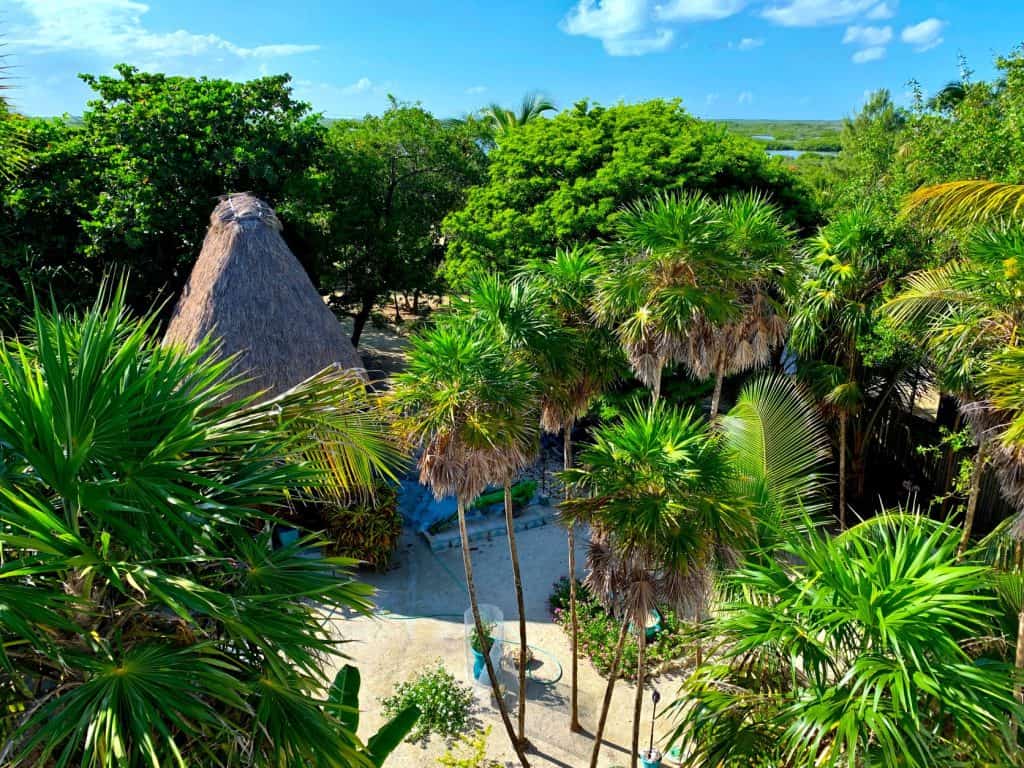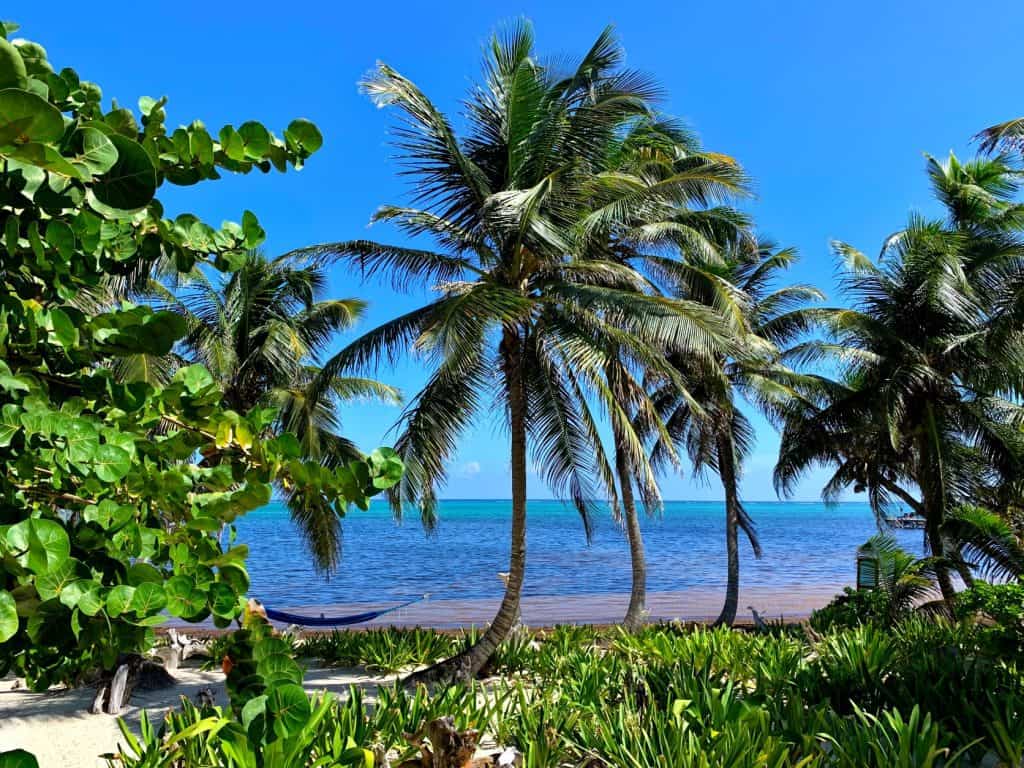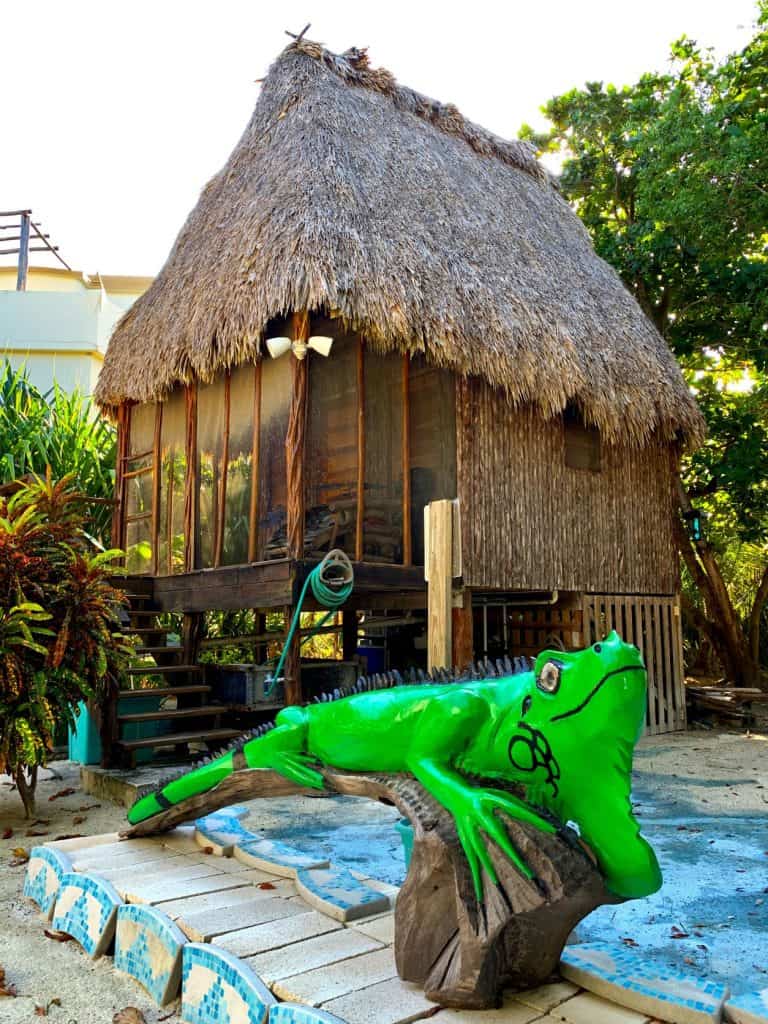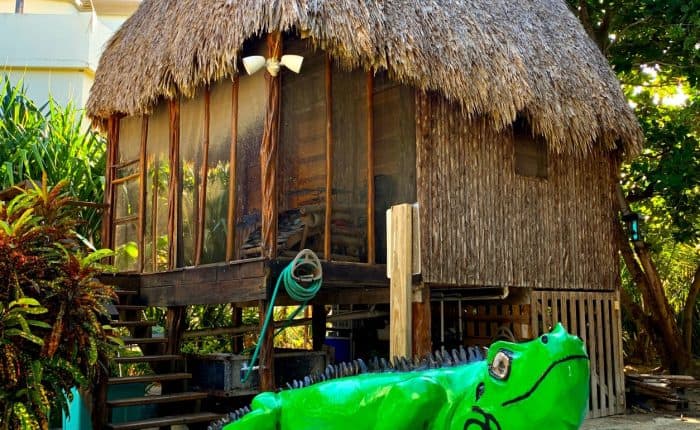Seize your lifestyle in Belize. Enjoy Relocating to Belize: Lifestyle Part 2 where my husband, Darryl, and I chat with Curtis and Cindy Evans about their lifestyle in Belize. If you missed Part 1, you can read it here.
Charlotte Tweed: Do you work from home or are you retired?
Cindy Evans: I am retired. Curtis works in town and then, he drives back and forth.
Curtis Evans: I just started with ECI Development because I wanted to work when we got here. The thing is you need a work permit or you need to have residency. I couldn’t do anything and Cindy was worried about it, “Okay. Let’s get our residency done. Then, you can do it.” But she’s been retired for …
Cindy Evans: 10 years.
Curtis Evans: I wanted to go back to work.
Cindy Evans: Curtis can’t retire. I have hobbies. I have interests. I have master class. Every day I can do something that fills my days. He would sit there saying, “What’s on TV,” He needed to work. Some people have to work.
Charlotte Tweed: That’s a good attitude to have. I can see that you want to immerse yourself in the culture here. To make life more than sitting on the beach and leading a privileged life. How has your positive attitude affected how you view your future in Belize?
Cindy Evans: Well, we are Belizeans. We flew the Belizean flag last month on their Independence Day. Belize is our home. One of the best things I can tell any expat or anybody, I don’t even use that word expat—we’re Belizeans. You came to another country for a reason, and that reason is to belong to that country. You need to talk to Belizeans, integrate with Belizeans, think like Belizeans, and not like expats. They still have a little grocery store here that has all the expat stuff. If you want to pay $26 for a bag of potato chips, you can. I cut Curtis down to the $14 potato chips and only get them once a month.
There are things we’ve had to import. The mindset of, “It should work my way, we should be American, we know the best in that type of situation” needs to change. You need to think like Belizeans—we get more done with that approach.
Charlotte Tweed: I think that will lead to a happier lifestyle as well. Otherwise, you’re going to be very frustrated the whole time you’re here.
Cindy Evans: You are right. We know lots of people that have been here several years, that they go to the same place that all the expats go, they go to the same grocery stores. They don’t know about the discount cards. I say, “You know what this grocery store offers … ”
Experience the Insider community that takes your international lifestyle to the next level. Download your FREE guide
"18 Steps to Implementing Your Plan B" instantly!
“No, we don’t go to that grocery store.”
“Why? They’re cheaper?” I’ll reply.
They respond, “No, because everybody goes here.” Obviously, they don’t because we’re not going there.
I have a belief system. I get asked, “How do you get things so cheap, Cindy?” I say, “Because I’ve gone to every single grocery store and I get my discount card,” because that’s what I would do at home, so I practice that here as well. We go to the thrift clothes stores. We go to places expats won’t go because we are Belizeans. We’re not expats. I think that’s the best advice I can give anybody who moves to a new country.
As I said, I lived in India for a while—that’s what taught me to adapt. Even though white, blonde women are gods in India, and you never would wait in a line, they will grab you and put you in the front, the privilege is unavoidable. It was one of the reasons I didn’t want to move there on a final basis because the privilege is unavoidable. Here, it is avoidable. You can avoid being the privileged expat if you accept that.
Charlotte Tweed: Just the brief time we’ve been here, we don’t feel like we stand out. We feel like we blend in. We feel extremely comfortable.
Cindy Evans: This is why we’re here. We get people all the time saying, “We see you in town all the time.” And here we think we’re stealth. We’ll go to the glass guy, and he says, “I see you all the time. What do you want?” Like they are your buddies. And that’s wonderful. And waving, especially with corona, half the time we wave at people, we have no idea who they are. But I don’t care. Wave anyway. We’re all friends.
Charlotte Tweed: I’ve noticed how much everybody waves here.
Cindy Evans: Oh yes. It’s a small town. I don’t know if you come from a small town.
Charlotte Tweed: Originally, yes. Darryl and I both come from small towns.
Cindy Evans: See, I had no experience with the small-town attitude. Los Angeles and Southern California, and Pittsburgh, or Southern California, so no. No, experience with that at all. We just wave to everybody. Curtis will ask, “Who was that?” I’ll respond, “I don’t know.” People will use my name and I have no idea who it is. But that’s okay.
Charlotte Tweed: You are quite the world traveler, which has helped you adapt quicker.
Cindy Evans: Yes.
Charlotte Tweed: I’ve heard the question to ask you is what countries you have not visited?
Cindy Evans: You know where I haven’t been a lot is Europe. I’ve gone to Italy; I’ve gone to Spain. I’ve gone to Spain several times, Italy, Greece. But I’ve not gone to Romania and England and all of these because I always thought they had the infrastructure where I can be old and visit. I was more of a “Let’s go to Antarctica, let’s do the Trans-Siberian railroad. Let’s go to Siberia, let’s go to India. Let’s do the things that have a little more physical requirements to do,” and do all those first. I still have those other countries on my list.
Charlotte Tweed: I think that’s why it’s important to go and see countries for yourself. To realize what you like and don’t like. We can’t look at other countries with rose-colored glasses.
Cindy Evans: Oh, absolutely. I go crazy when I hear people are going to move to Belize and have never come here. I don’t know how they do that. Curtis did it. He moved. He’d never been here, and I would never have done that in a million years. He just trusted me.
Curtis Evans: The only reason I moved without coming first is because of the way Cindy is. She did her due diligence. She’s a world traveler, and I put my trust and faith in her. If she would’ve said, “I’ve only been there once,” or “I don’t know that much about it,” then no.
Charlotte Tweed: Your trust is the sign of a strong relationship. Now, what about living in a single-family home rather than a condo. What’s your yard work like? What’s the upkeep? Do you have someone that cleans it? Or do you do it?
Cindy Evans: Oh, no. Curtis used to.
Charlotte Tweed: Your yard is beautifully maintained.

Cindy Evans: Curtis used to do it. And then he injured his neck. We were trying to get all the seagrass. He was trying to pull a cart. He injured his neck and limited what he was able to do. He still has a fetish over any leaf that’s cutting off the palm tree. He’s also not allowed on the ladder because he would be up on the ladder, on the top rung—this is a man who wouldn’t get on a ladder until we came here. He was afraid of heights. Now he’s on the top ladder, with no hands with a pole trying to get coconuts.
Charlotte Tweed: Did he tell you he was on the top floor of the new building at the Grand Baymen?
Cindy Evans: Yes. He showed me the video from the roof. Curtis is a changed human. He was on multiple anxiety medications before we moved. And now, he’s a changed human being.
Charlotte Tweed: Incredible.
Cindy Evans: That’s what it does for you when you don’t have to worry. And even with COVID, I’m more paranoid than him. We have a casita here. Now, it’s for our live-in caretaker. Expats think we need people to take care of us all the time while we are here. We didn’t have that in the States. Why would I want it full-time here? We have a housekeeper that comes once a week, cleans the house, does all the windows whatever you want.
We have a house yardman, a handyman that comes once a week and he does everything else. He does a beautiful job. All that rock work out there, he did it.
We’ve been with the people that have helped us because we hear horror stories of other people. And we pay Belizean prices. The other people are not doing that either. It’s like they’re getting ripped. But I just leave it alone. I figure, if a Belizean can convince them, that’s fine. They have the money. That’s fine. We have someone that helps us because we’re on rain catch, too.
I didn’t even know about these things because we have a septic tank. We never had a septic tank before. We’re on rain catch, and I hooked up the water. It’s all water that’s collected for us. You have your pump to bring it into the house and things like that. I still don’t know where the water is. It’s under the house somewhere.
Charlotte Tweed: You use that for showering and washing dishes, and all that?
Cindy Evans: Yes, everything except for drinking.
Charlotte Tweed: Excellent.
Cindy Evans: Everything. We’d stick chlorine in it just because I didn’t like the smell.
Curtis Evans: It runs the whole length of the house.
Cindy Evans: It’s huge. We used to check it all the time because I was paranoid and the water has never gone down. I never used to water the plants. Now I water the plants. I do everything with the water. We’ve never had any issues.
Charlotte Tweed: Fascinating.
Curtis Evans: You were asking about the yard. Seventy to 80% of those plants and flowers out there, that’s Cindy’s. She’s out there working in the yard every day.

Cindy Evans: It was a jungle back there. Curtis had to cut it. He cut down around 20 trees and did that trying to get it to not be a jungle.
Curtis Evans: I’m going all the time with Cindy’s yard. She said, “I’ve got to get more flowers. I’ve got to get more cement.” Did you see those shells that went down? She’s fascinated with conch shells. We went up all the way north, and I was collecting all these shells for her.
Cindy Evans: And now I’m talking to a fisherman who throws them away or back into the water and let me have them instead of having to do that. I’m hoping that works out.
Darryl Tweed: If you don’t mind, may I ask how much it costs for your caretaker and housekeeper?
Cindy Evans: It’s 75 Belize for the caretaker, and I pay 90 to the housekeeper because it’s two people.
Darryl Tweed: Okay.
Cindy Evans: They come, and it’s a shorter time period that they’re invasive to the house. Our expenses without the house payment, and that’s having $500—this is Belizean dollars—$500 Belizean for entertainment and things like that. Is it only $4,000 a month?
Curtis Evans: Mm-hmm.
Cindy Evans: That’s 4,000 Belize. That’s 2,000 U.S. That includes going out to eat, buying what food you want, and having dentist and medical—not the $28 bag of chips.
Charlotte Tweed: For the housekeeper and the caretaker, is that per time they come in person?
Cindy Evans: Yes, per time they come. It works out to 200 U.S. dollars a month to have a housekeeper. $150 a month to have a great yard guy that spends eight hours here.
Darryl Tweed: I’ve heard stories, as you said, the expats come down and inflate the prices. Instead of paying them $200 they want to pay them $600 or $700 for that same service. And that ruins the way of life.
Cindy Evans: There are enough people here that need their work. We just tell them no to inflated prices. They expect higher wages. We say, “No. This is what you will make. This is what an average person makes.” Yes, we pay a little more, I mean, the contract people who do cement work at 45 Belize a day. During the construction, I told the guy, “No, no, no. We’re paying $60 a day minimum.” I know how much they have to eat. It costs them $20 at least to eat a day. So, no. I don’t want to be that person inflating the prices. I don’t want the people on my property to feel they’re being abused either.
Charlotte Tweed: Right.
Cindy Evans: But even still, I’ve built properties. It’s so cheap on that end of the spectrum. You just go wooh! Other than getting materials here from the U.S., that’s when you have to pay a lot.
Curtis Evans: We went through several different housekeepers and other people because of differences. Again, some of them didn’t show up for work or something happened.
Cindy Evans: We only had three.
Curtis Evans: Yeah. The one, the guy he said, “Oh, I can come and I can build the yard, but I have to charge you 100 U.S.” “100 U.S”, I said …
Cindy Evans: There’s the game.
Curtis Evans: He said, “But when you see the job that I do…” I said, “No.” Okay. He said, “Well, all the other expats or other people, they will pay me this much.” “Well, go to them,” Is my reply. As you said, that’s where some of the people that come in and they inflate it and they say, pay them more and-
Cindy Evans: Well, we do that with our artwork, too. The lizard out there, the guy whom we stopped, said, “We want $3,000 for that.” Not in my lifetime. We kept going. He said, “Well, how much are you going to pay?” And I went, “The most I would pay is 800.” I didn’t think he’d take 800 Belize. He said, “No. I made this for someone that wanted it, and it’s 3,000.” My response was, “That’s fine. I’m not mad. You’re not mad. I’m out of here.” Well, he pulled Curtis over in front of a store and he said, “I need the money. I’ll do it for 800. And I’ll repaint it for you.”

Curtis Evans: A lot of people are not used to someone like Cindy that bargains back and forth. Mostly, they expect it, and they’d say, “Oh, it is this much in the U.S.,” or “It’s this much in wherever” You don’t pay that. Just like buying a car, you don’t go in and pay full price, you know?
That’s like that one painting that’s behind you. We had a guy in town do that, and then when he delivered it, she struck a price with him. Cindy said, “This is what I want. This is what I want to pay you.” And he said okay. Then he delivered the painting and he said, “Oh. There’s a problem.” Cindy said, “What’s the problem? He says, “I worked hard. And then, I worked harder. I need more money.” And she said, “You’re a professional. You set a deal for this, and this is what it is.” And he said, “I need $100 more.” And she said, “No.”
Charlotte Tweed: I guess the key is to know the local prices and be firm. Have you come across any other unsuspected surprises?
Curtis Evans: You didn’t tell her the other thing about it.
Cindy Evans: What?
Curtis Evans: You didn’t tell her that I didn’t know that I wasn’t able to get Popeye’s Chicken.
Cindy Evans: I did. I did tell him. I said, no fast food. He’s still having culture shock over that. No fast food.
Curtis Evans: Yeah. There are no fast-food chains anywhere in the country.
Cindy Evans: Nope, they won’t allow them.
Charlotte Tweed: Which I like.
Cindy Evans: Absolutely and support it.
Charlotte Tweed: Love it. Thank you again, Curtis and Cindy, for inviting us into your home to share your story.
Curtis and Cindy Evans are California expats (or should I say Belizeans) who dared to leave their homeland and start a wonderful lifestyle in Belize. Check out the first interview here.
 Charlotte Tweed is an adventurous soul with a goal to take you on a journey where you don’t just visit—you live it. Graduating with a Travel and Tourism Honours diploma, Charlotte began her expat journey on June 15, 2021. After travelling through multiple countries, Charlotte now calls Mexico home. Reading, writing, and researching the best expat destinations in the world are how she fills her days. As a published author, her mission is to transform your life with expat travel—one destination, one adventure, one story at a time.
Charlotte Tweed is an adventurous soul with a goal to take you on a journey where you don’t just visit—you live it. Graduating with a Travel and Tourism Honours diploma, Charlotte began her expat journey on June 15, 2021. After travelling through multiple countries, Charlotte now calls Mexico home. Reading, writing, and researching the best expat destinations in the world are how she fills her days. As a published author, her mission is to transform your life with expat travel—one destination, one adventure, one story at a time.
Like Our Articles?
Then make sure to check out our Bookstore... we have titles packed full of premium offshore intel. Instant Download - Print off for your private library before the government demands we take these down!







